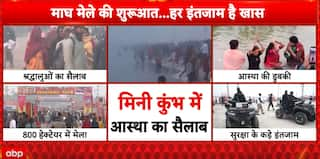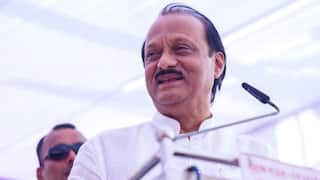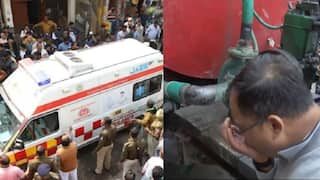Kejriwal Arrest Recap: When Justice Sanjiv Khanna Asked 'Why AAP Not Implicated In Delhi Liquor Policy Case'
Kejriwal Bail: The Supreme Court on Friday granted interim bail to Chief Minister Arvind Kejriwal in the Delhi Liquor Policy case till June 1 to campaign for the ongoing General elections.

Kejriwal Arrest Case: The Supreme Court on Friday granted interim bail to Chief Minister Arvind Kejriwal in the Delhi Liquor Policy case till June 1 to campaign for the ongoing general elections. A bench of Justice Sanjiv Khanna and Justice Dipankar Datta pronounced the verdict today. As the Aam Aadmi Party chief is all set to walk out of jail after over 50 days, here a quick recap of where it all started.
In October 2023, while hearing arguments in former Delhi Deputy CM Manish Sisodia's bail plea, Justice Sanjiv Khanna had asked the Enforcement Directorate as to why the AAP, which is alleged to be a beneficiary of the "scam", is not made a party in the Delhi Liquor Policy case. Interestingly, the observation was made by the same bench that granted interim bail to Arvind Kejriwal Friday.
The question by Justice Khanna had created a media frenzy. However, the court during the very next hearing clarified that it was just a legal query and not a direction to implicate AAP.
ALSO READ | Why SC Gave Arvind Kejriwal Interim Bail — Top Arguments In Delhi CM's Favour
During a subsequent hearing, however, Additional Solicitor General of India SV Raju told the Supreme Court that the Directorate of Enforcement is contemplating making the AAP an accused in the money laundering case and invoking Section 70 of the Prevention of Money Laundering Act (PMLA) to probe the aspect of "vicarious liability."
Following this, ED started its investigation and ultimately arrested Kejriwal as the kinpin and key conspirator as the head of the AAP.
After making AAP a party to the case, the ED implicated Arvind Kejriwal as the "ultimate incharge of the AAP" who it claims was intrinsically involved in the acts of policy formulation, kickback scheme and the final use of the proceeds of crime thus generated including conspiracy thereof.
The ED has alleged that Kejriwal is also liable for use of Proceeds of Crime of Rs 45 crore in the election of the AAP in Goa under section 70(1) of PMLA apart from his role in his personal capacity.
"Kejriwal has conspired with other persons and actively involved in formation of policy for facilitating taking of kickbacks and has played a role in generation, use and concealment of the proceeds of crime," according to ED.
The remand note by ED says "due to actions of Sh Arvind Kejriwal involving excise policy formulation, hatching the conspiracy of kickbacks with the South Group members, and eventually using part of the proceeds of crime generated out of this scheduled offence in the election campaign of AAP for the Goa Assembly elections, it is clear that all these activities were not only done with his knowledge but also his active collusion."
ALSO READ | SC Bars Arvind Kejriwal From CM Office While On Bail. These Are His 5 Bail Conditions
Kejriwal Arrest Case Timeline In Courts
- On March 14, Delhi Chief Minister moved the sessions court challenging summons issued to him by a magisterial court on ED's complaints alleging non-compliance of the summons issued to him in the now scrapped liquor policy case. Kejriwal has skipped 9 summons by ED so far. ED had raised the complaint in a magisterial court. After giving Kejriwal time to respond the Additional chief metropolitan magistrate (ACMM) Divya Malhotra asked him to appear before it on March 16.
- On March 15, Arvind Kejriwal was granted bail by a Delhi Court in ED's complaint for skipping summons. The court then instructed him to furnish a bond of Rs 15,000. The next hearing in the case will be held on April 1.
- On March 20, The Delhi High Court heard Kejriwal's petition challenging ED summons and sought reply from the ED. ASG SV Raju appearing for the ED told the court that Kejriwal's pleas are not maintainable. During the hearing, the bench asked Senior Advocate Abhishek Manu Singhvi appearing for Kejriwal as to why he is not appearing before the agency for questioning. Singhvi said that they apprehend that ED will arrest him and Kejriwal will appear if he is given protection.
- "You are citizen of the country, the summons is by name only. Why don't you appear," the bench asked. Singhvi however, told the court that AAP leaders Manish Sisodia and Sanjay Singh were also arrested by the agency in similar manner.
- On March 21, the Delhi HC refused to grant protection from arrest to the Delhi CM. Kejriwal had filed a plea seeking protection from coercive action in Delhi's liquor policy-linked money-laundering case. On the same night, Kejriwal was arrested by the ED at night.
- On March 22, the Delhi CM was remanded to six day ED custody by the special judge in Delhi's rouse avenue court till March 28. ED had sought 10 days of remand for the chief minister. Earlier in the day, Kejriwal also approched Supreme Court against his arrest. However, he later withdrew the challenge and went to the trial court. The trial court remanded him to six days of ED custody.
- Kejriwal then approached Delhi High Court seeking an urgent hearing, however, due to the holi vacation, his case is listed for March 27 (a day before his six days custody ends.)
- On March 26, the Delhi HC heard his plea challenging his arrest and ED remand, as well as his plea for interim relief of immidiate release. ASG SV Raju appearing for ED seeks time to file reply to "bulky petitions" filed by Kejriwal against his arrest. Justice Swarana Kanta Sharma of the high court refused the prayer for immidiate release and issued notice to the ED in both his petitons.
- The Delhi High Court in April rejected Arvind Kejriwal's plea challenging his arrest, following which he moved the Supreme Court.
- The Supreme Court on May 10 granted him interim bail to campaign for Lok Sabha elections and he will have to surrender on June 2. However, the challenge to legality of his arrest is still pending in the top court.





































